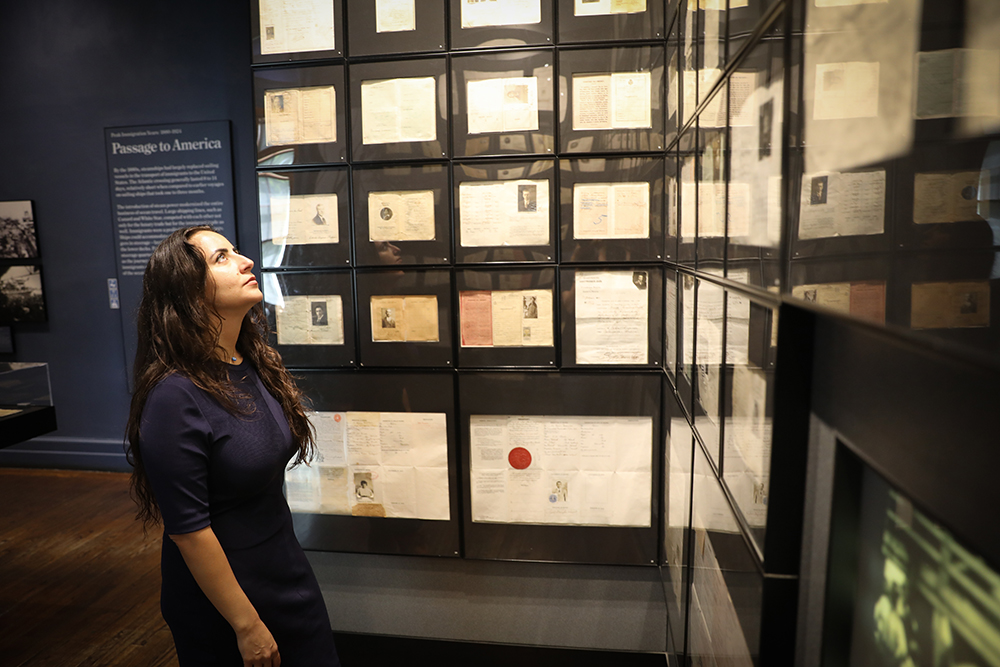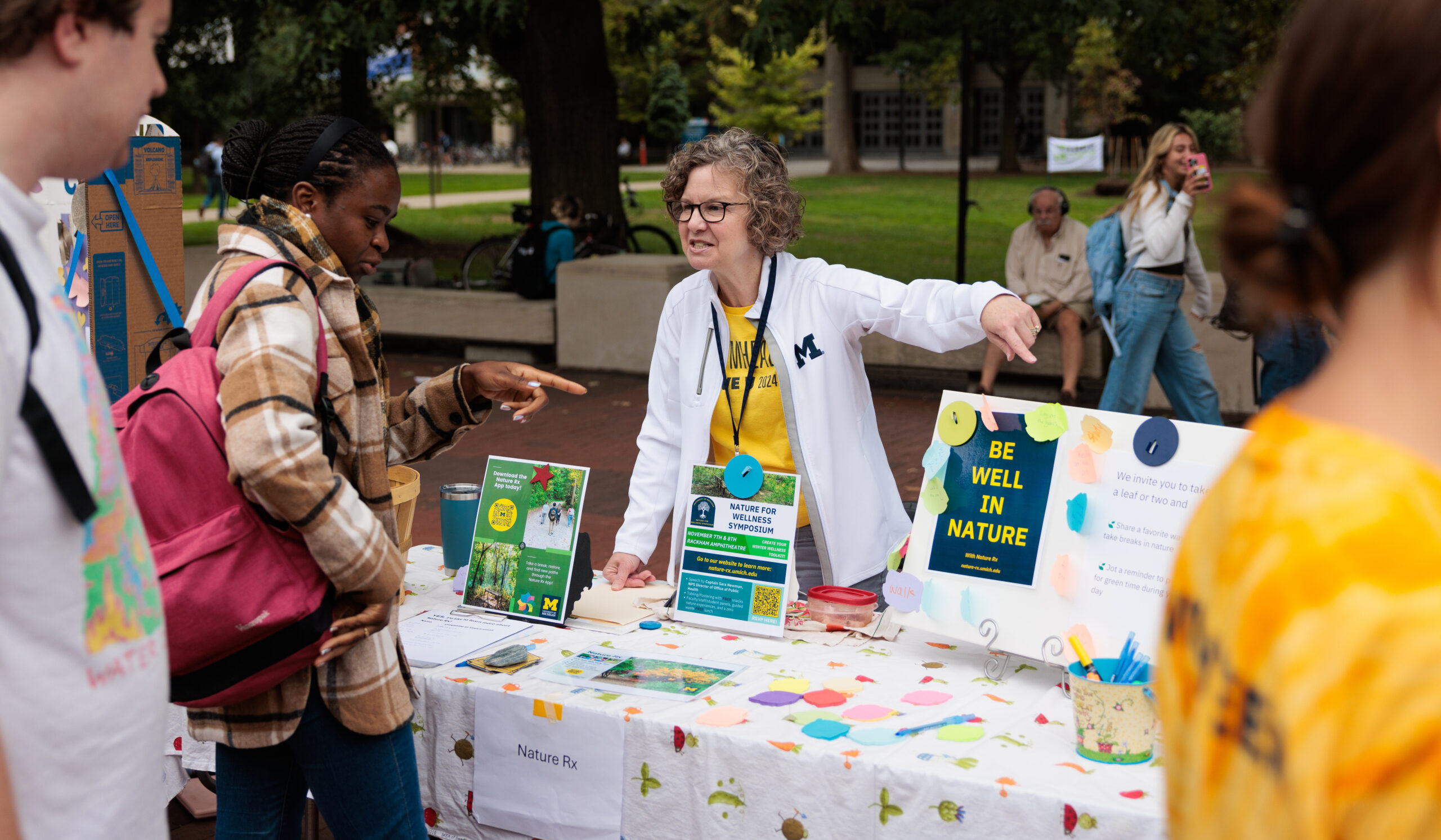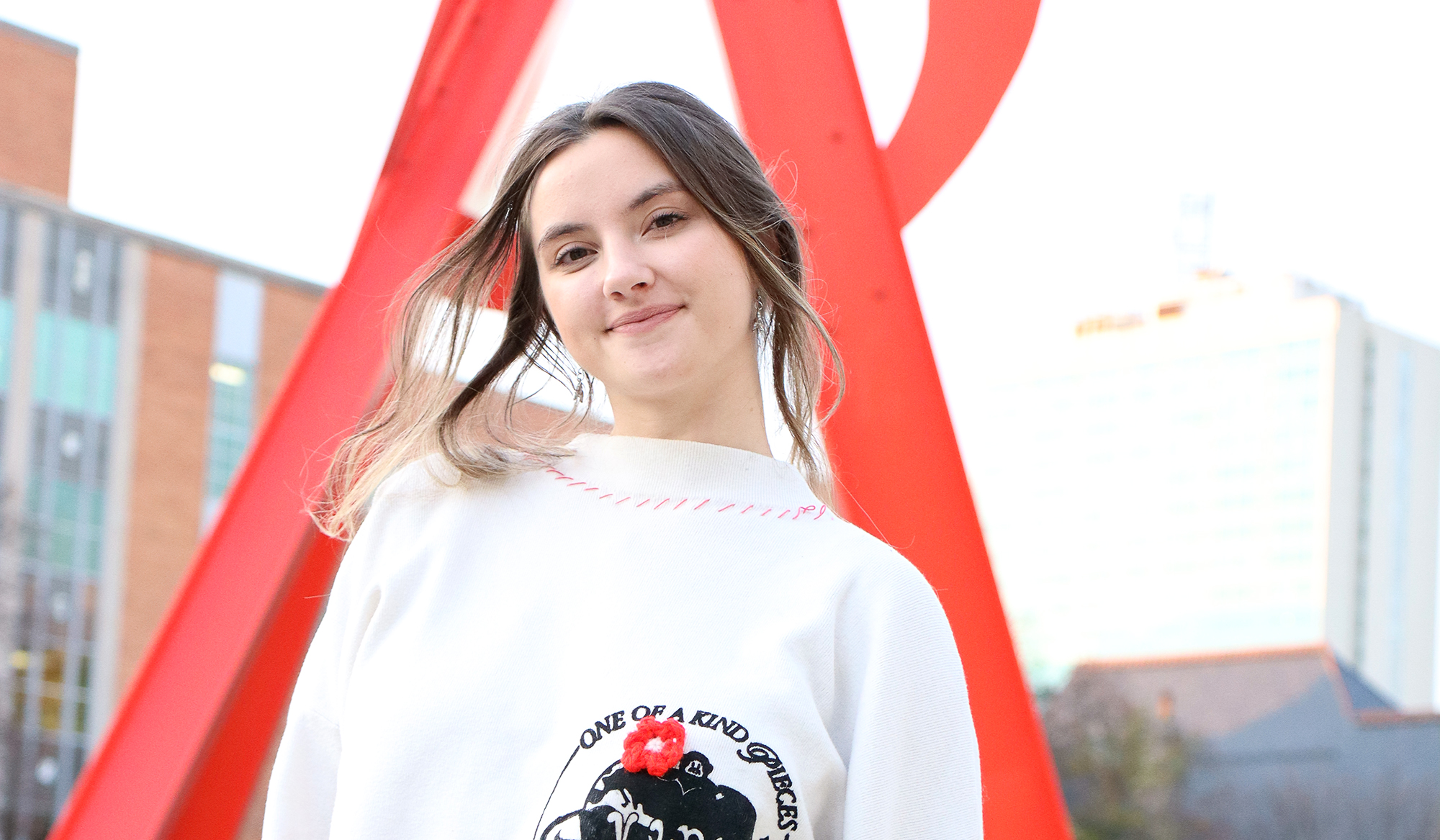‘The American Dream Kid’
•
Photos by Jessica Yurasek
This story is part of a package of three democracy and voting articles published in the Fall 2024 issue of Michigan Alum. Click here to learn how U-M is preparing to support student voting and how a U-M professor is working to expose and secure potential voting vulnerabilities.
By the time Ghida Dagher, ’12, and her family had come to the United States in 1999 seeking asylum from a civil war in Sierra Leone, her parents had lost their home and businesses and started from scratch four times.
So the family was always ready to pick up and flee at a moment’s notice.
“We always had a bag — a Samsonite briefcase — that was packed at all times with our passports, our school records, immunizations, all the things that we would need if, God forbid, we had to run again,” she says.
Dagher was 9 years old when her family received temporary protected status in the U.S.
“We knew we had a lot riding on this. We knew this was almost our last resort, the last place that we were going to be able to find a safe haven,” she says. “My parents were really looking to give us stability and security in a place where we could pursue opportunities and education.”
Two years after arriving in the U.S., the 9/11 terrorist attacks immediately made Dagher worry that her family would need that Samsonite briefcase once more.“
When 9/11 happened, I remember coming home and people saying, ‘You’re not going to be able to stay. They’re going to tell you to leave. You’re a visitor in this country,’” she says.
But Dagher and her family weren’t forced to leave. Instead, she went on to become a Wolverine and a U.S. citizen, and focused on trying to make a wider impact in her career.
“I often say that it’s my immigrant experience that grounds me, but it’s my American experience that propels me,” she says.
Today, Dagher is blending her experience as an immigrant and her desire to help others as CEO of New American Leaders, a nonprofit organization that encourages and trains first- and second-generation Americans to run for public office.
Escaping Sierra Leone
Dagher, who has three siblings and is 100 percent Lebanese, remembers Sierra Leone as a beautiful country, a place where life comes before work.
“You contribute to your work, but you are there to live and enjoy nature and enjoy family and community. And we had such a beautiful community before the civil war happened,” she says.
Lasting almost 11 years, the United Nations says there were up to 70,000 casualties and an estimated 2.6 million people displaced as a result of the civil war.
Dagher’s family tried moving to Lebanon, but things were also very unstable there, so they returned to Sierra Leone.
“It was rough. It was really, really rough,” she says. “There were a lot of tragic things that happened during that civil war and we were very fortunate that we were able to get out and that we had the resources to navigate some of these really tough times.
At one point, the family took refuge in a hotel that was supposed to be in a safe zone, but it got attacked.
“We were held hostage as a collective for 13 hours. And the hotel started burning on top of our heads,” she says.
During these turbulent times, she saw service up close. Her father was a gastroenterologist, but he was there for those who were injured because he felt an ethical responsibility to help.
“I remember growing up, people were knocking on our door in the middle of the night and my dad treated everybody,” Dagher says.
Ultimately, the family escaped Sierra Leone on a cattle cargo ship.
“I feel incredibly fortunate and have an immense gratitude, not just for the way the things shook out, but in particular, for my parents’ bravery,” Dagher says. “To make that very tough decision to start from scratch, to frankly do it in a place where there’s opportunity but doesn’t always appreciate what immigrants contribute.”

Becoming a Wolverine and Citizen
Dagher’s family came to the U.S. on a visitor visa and applied for asylum upon landing in Detroit. They received temporary protected status, which would be renewed every six months as they waited years for their asylum case to be heard.
In the meantime, Dagher started her American experience in fourth grade in Dearborn, Michigan. By the time Dagher was in high school, the civil war in Sierra Leone had ended and her family’s asylum case was finally heard. Because the war was over, the claim was rejected, and the family began discussing what was next.
Her father, who couldn’t practice medicine in the U.S. but worked at a doctor’s office coordinating office visits, put in his notice at work, explaining to his boss the situation. The doctor intervened, sponsoring his work visa so they could stay in the U.S.
Dagher enrolled at U-M in 2007 and majored in political science and modern Middle Eastern and North African studies. She became very active on campus with groups such as the Arab Student Association, Lebanese Student Association, and student government.
“I’m so proud to be a Wolverine, and it has shaped me in so many ways,” Dagher says. “My education happened in the classroom, but even more valuable was the education and the real life that happened outside of the classroom on that campus. I was really shaped, truly, as a leader. I felt like I walked out of that campus ready to take on whatever I wanted to do.”
While a senior at U-M, Dagher became the first in her family to become an American citizen.
She says the family called her youngest brother their “All-American Kid” because he doesn’t remember the time before coming to the U.S. Dagher was dubbed “The American Dream Kid” by her oldest sister.
“[She called me that] because I have such belief in these American values and in this opportunity that exists,” Dagher says. “And while I’m pragmatic and realistic about all of it, I still have very deep faith in what it could possibly achieve and mean.”
New American Leaders
After graduation, Dagher went to work for the National Network for Arab American Communities, and then the United Way of Southeastern Michigan. She was then tapped on the shoulder and encouraged to check out a newer nonprofit called New American Leaders. The group sprung up in 2010 after Arizona’s so-called “show me your papers” law.
Dagher, who wasn’t interested in running for political office, reluctantly went to a training the group was putting on.
“It was the most diverse room I had been in since [the University of] Michigan,” she says. “It was Latinos, Arabs, Asian Americans, Black immigrants. I was thriving off of that, and we had really great discussions.”
It became a catalyst for her to be more involved with politics. Soon she was managing campaigns and found herself working for Michigan Gov. Gretchen Whitmer as director of appointments.
“Michigan taught me to be a big systems thinker and think about the impact,” she says. “And every job I took, I hoped for a bigger impact because you want to address root cause and more root cause.”
Dagher had worked with New American Leaders for years to train immigrants to run for office, and when the group’s founder, Sayu Bhojwani, left the organization, she came on as its CEO and president in 2021.
“Our job at New American Leaders isn’t to pressure anybody to run. It’s to help them see their own leadership and their own potential, and also talk about what it would mean for their communities to have that kind of representation,” Dagher says.
The group has trained 1,800 people in small cohorts, with about 250 who have come through the program elected to public office. This election season, 74 alumni of the program will be on the ballot.
“I often say that it’s my immigrant experience that grounds me, but it’s my American experience that propels me.”
- Ghida Dagher, ʼ12
In addition to the training sessions for people interested in running for office, the group also has events for elected officials. It recently held a seminar on Ellis Island in New York City with current lawmakers discussing immigrant history, economics, labor, and services.
Among those attending was Alabas Farhat, ’21, a Michigan State Representative who went through the program in 2018 and first connected with Dagher through her political work.
Farhat is a first-generation American who helped his parents navigate life in the United States.“I was always interested in public service and finding ways to bring the lived experiences of people like my parents, people like my neighbors, to the halls of power and where decisions are being made,” he says.
Farhat saw Dagher’s work in Dearborn up close, calling her “no nonsense” and saying she brought a level of professionalism to campaigning that was previously lacking in their community.
“She’s now doing it at a national level where she’s helping folks from new American backgrounds of first- or second-generation families to realize the power that their voices and their perspectives have in this great American experiment that we all are a part of,” Farhat says.
New American Leaders is a nonpartisan organization, supporting candidates from all backgrounds.
“Whenever there’s a qualified person who’s a new American, regardless of party, we’re going to celebrate that,” Dagher says. “And if it’s someone who sticks to the values of being pro-democracy, for immigrant-friendly policies, we’re going to celebrate that as an organization.”
JEREMY CARROLL is the content strategist for the Alumni Association of the University of Michigan.



